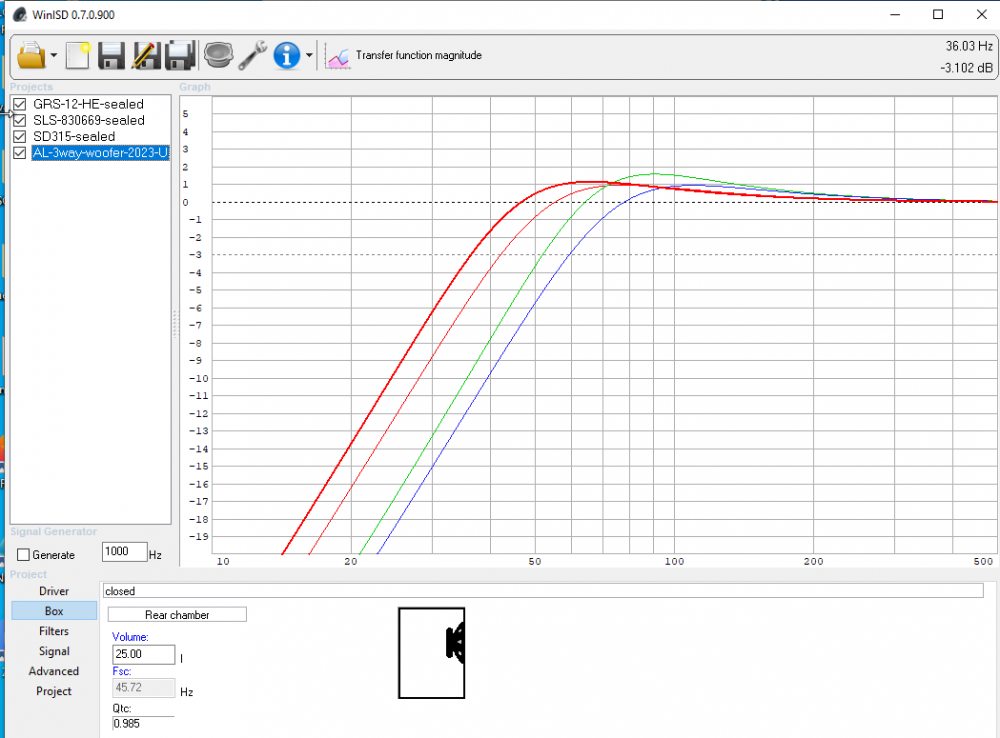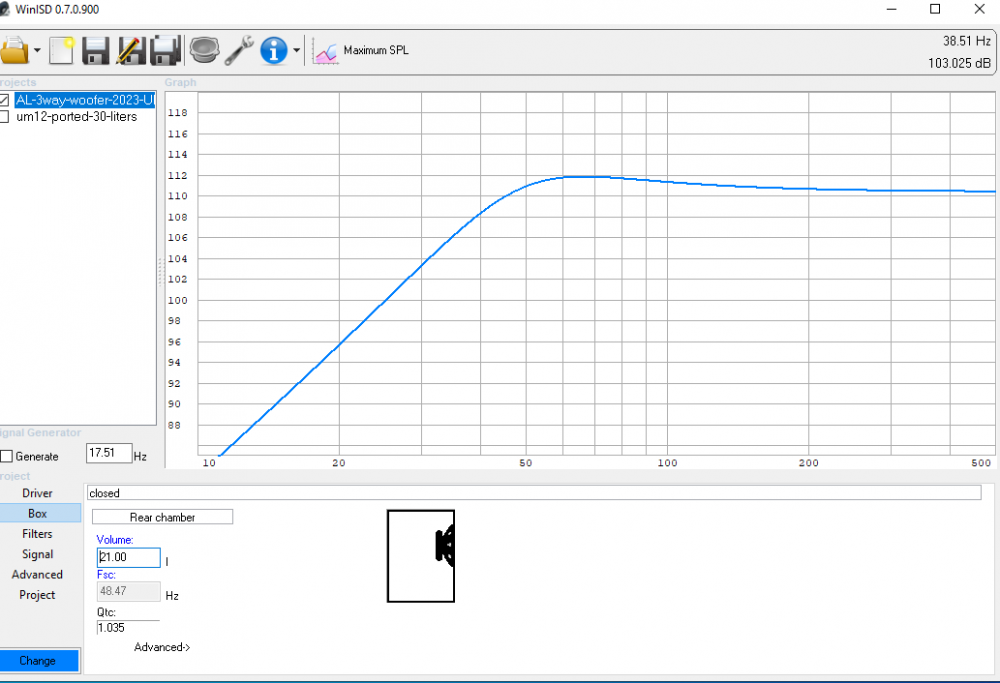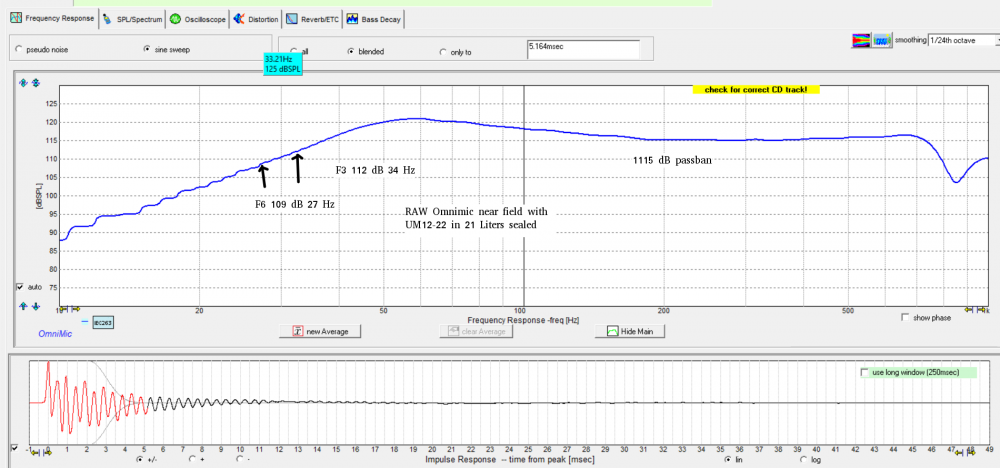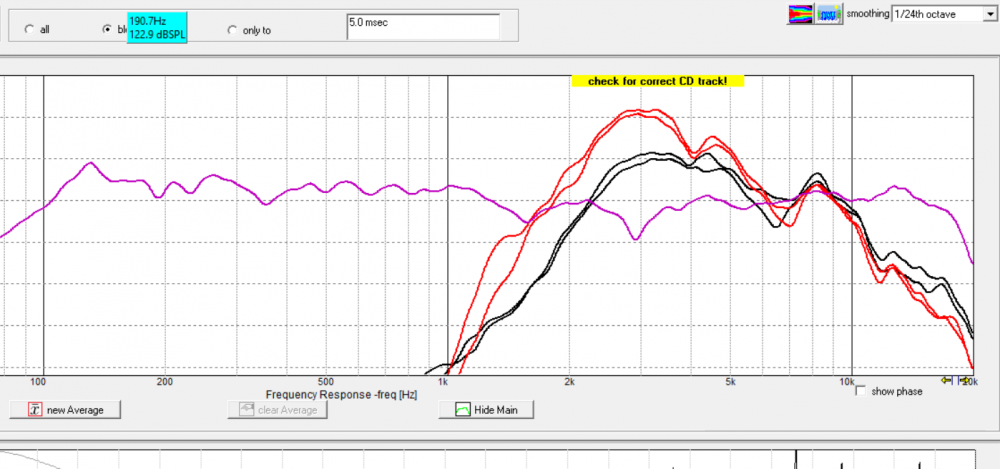Site Links
Howdy, Stranger!
It looks like you're new here. If you want to get involved, click one of these buttons!
Quick Links
Categories
In this Discussion
Please review the site Rules, Terms of Service, and Privacy Policy at your convenience. Rules, TOS, Privacy
Get familiar with the reaction system: Introducing the Reaction System
Als compact monkey box 3 way design-build thread
One of my friends (Al)) gifted a nice 3 way I had sold him and needed a replacement.
I wanted a monkey box with a 12" woofer, 6" inch mid, and ESS Heil AMT tweeters.
I had previously used a Linkwitz Transform for a small sealed box with a RS270, and really liked it, and wanted to use it again.
Also, I have been convinced by Amir's tests that port resonance and port leakage can really affect the final result.
Looked at a bunch of 12 inch woofers on PE, here are the top for a box no larger than 25 L, QTc about 1.0
Top 2 woofers are a UM12-22 and a GRS 12HE.
Honestly the GRS digs almost as deep as the UM - does it make sense to spend extra on the UM12?

But Chahly - Stahkist don't want speakers that look good, Stahkist wants speakers that sound good!
Tagged:

Comments
A big determining factor will be the frequency you want for your crossover from the woofer to the mid. The GRS has 3.5 mH voice coil inductance and, as a result, output drops by about 6 dB from 100 Hz to 400 Hz. You would be best off to do an active crossover around 100 Hz or some bandpass box configuration with that driver as the values to do a passive crossover at that frequency get a little silly.
The UM-12 has a voice coil inductance of 1.25 mH and still has smooth strong output to around 800 Hz (I probably wouldn't try to cross it that high, but 300-500 Hz seems reasonable). On the other hand, you do pay for that extra capability...
Sehlin Sound Solutions
Yeah, the GRS won't anchor a 3-way. It is a killer subwoofer driver, though.
Ok, thanks guys. Going to bring up the UM12 in a test box soon. I suspect it will be a killer bottom for a 3 way. Not sure how it will mesh with a fairly high efficiency mid. I will post measurements of the Linkwitz Transform. The SB application brief formulas worked out to about 2200uF - got a couple of big NPEs.
ScottS said --> "The GRS has 3.5 mH voice coil inductance and, as a result, output drops by about 6 dB from 100 Hz to 400 Hz." (in reference to the GRS12SW-4HE subwoofer).
ScottS - How did you arrive at that determination, please?
WinISD does not show this drop in SPL during modeling.
Thanks.
Let's be careful here...
You used a Passive Assist via capacitive loading, which is a passive circuit structure.
A Linkwitz Transform involves active electronics, EQ, and/or a boost via preamp level active circuitry.
The LT is better at doing the job than a PA, but you can still have gains in the PA method.
InDIYana Event Website
Oh, OK. Thanks Ben - I will accept your definition as fact. I had thought the term applied to
either passively or actively.
It shows up on the spec sheet. https://parts-express.com/pedocs/specs/292-820--grs-12sw-4he-spec-sheet.pdf
Ron
OK - Thanks Ron - I was looking right at it too . . . Duh!
Any chance the falling response would alleviate the need for baffle step compensation?
Ron
I was thinking the same thing as Ron. Or, run you midwoofer in sealed box and be prepared to buy some big copper.
As Ron indicated, I just got that from the spec sheet.
Sehlin Sound Solutions
It might for a wide enough baffle... In conventional designs, you will see baffle step between 200 Hz and 1 kHz. I think it starts dropping too soon here and you would wind up with strong deep bass, then thin midbass through lower mids before starting to get reinforcement from the baffle.
Sehlin Sound Solutions
well, dog gone it. I got a stumper (not the first time...)
Winisd shows me exactly what I want, a sealed box with a Q of 1.0 and slight bump near the rolloff.
But Omnimic doesn't show that at all! I tried breaking in the 12 with bass for a few hours, but no difference.
Mic is about 1/2" from the cone, near center.
Try hitting the "all" radio button.
"check for correct CD track" is being shown, indicating that Omnimic has not locked on to the signal. As well, you can see in the impulse response at the bottom that the impulse has started well behind t=0, another indication that Omnimic has not set the window time correctly. SPL looks absurdly high as well.
If you're still having trouble, try switching to REW. At least then you will have control of the IR window post measurement.
You need to change the gating, graph shows 5.0 msec
Sheesh, tech problems again at my age!
One might say that the machine senses fear and provides me with challenges!
In any case, I was playing the Omnimic tracks (Track 2 of course) from my laptop, and recording from the USB mike.

There was a setting deep in the guts of the soundcard properties that said "Front speakers have been set to small"
IE: roll off the bass.
So played the tracks from my Linux box. Looking a lot better!
If you look closely at the last image above, response actually climbs 5-6 dB from the passband at 200Hz. This is way more than the WinISD model predicted, but the only solution was to increase the size of the test box. So I modified it to be about 31 liters, and got about a 2 dB rise, which I could deal with via the inline cap. And it worked out!
Very flat response, and an increase in response above resonance. I think I will go forward with this alignment.
I found that about a 500uF cap worked best in this case.
I was going to (try to) use the PRV 6MR500-NDY for the mids in this design, and had just finished a test box to measure them (particularly THD) and see how they sound, but then yesterday I saw this great sale:
Satori MWTX-8 Textreme 5 inch at almost 50% off - and I couldn't resist.
https://www.madisoundspeakerstore.com/approx-5-woofers/satori-5-mw13tx-8-textreme-cone-woofer-8-ohm/
Damn - that's a great deal and that cone looks very cool! If a driver can be called sexy, than this one certainly is.
I bought a set of those Satori's too.
Well, I have 3 pairs of ESS Heil tweeters on hand for this build.

Good news, consistency within a pair is quite good.
Bad news, FR is so wonky as to defy any use with passive crossovers, not to mention the steep drop off above 10Khz.
I'm going to sell them on Ebay, maybe I can break even.
Here is a plot of 2 pairs of the ESS Heils versus a SB29SDAC tweeter (as used in Jeff Babgy's Revolutions)
5 dB vertical axis divisions. Measured on axis at about 15 inches.
Is that ^ normal for the ESS Heil's?
Mine look nothing like that . . .
Have you tried contacting ESS to see what they say about it?
Good idea - for some reason it never occurred to me!
Here's what mine look like. They were measured sitting on a pedestal in open air.
Mine never measured well either.
https://www.jfcomponents.com/
Huge difference!
That's not too bad - only a 5 dB total swing, and they go out to 20K.
AMT's always measure weird, but yours RJ aren't right.